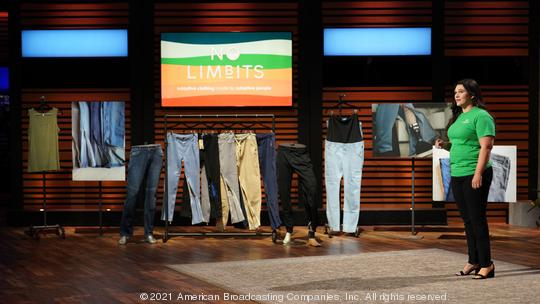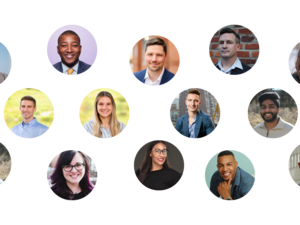
For seven months, Erica Cole had to keep a big secret. The 26-year-old founder of adaptive clothing brand No Limbits had earned a deal with Mark Cuban and Emma Grede on ABC's "Shark Tank" — getting $100,000 in exchange for 10% equity in the company. But she had to keep the deal under wraps. The episode finally aired April 1, letting everyone in on the news. And now Cole is in regular communication with the well-known investors.
Cole started her company after a 2018 car accident resulted in her left leg being amputated below the knee. She began creating clothing in response to a need for pants that fit over her prosthesis. That grew to No Limbits, which now offers clothing for amputees, wheelchair users and people who experience limited dexterity and sensory sensitivities.
The business caused a postgraduate pivot. Instead of taking a job at Los Alamos National Laboratory, the 2019 chemistry graduate from the University of Iowa decided to shift to retail, participating in an incubator from big-box chain Target Corp.
Now with a headcount of eight employees and an estimated $15,000 in monthly recurring revenue, Cole has grown her business from a $500 student pitch competition all the way to raising her pre-seed round. Though currently based in St. Louis, the business is relocating to Richmond later this year following Cole’s experience at the city’s Lighthouse Labs accelerator.
Cole spoke with Richmond Inno on how keeping her “Shark Tank” win under wraps was the hardest secret she’s ever had to keep, why she is making Richmond the new base for No Limbits and what’s next.
How did you prepare for “Shark Tank”? Have you always been comfortable being a public speaker? I was in the speech team in high school, and I did a lot of theater. So, the public speaking came naturally because I worked at it really hard. I liked performing and not being controlled by nerves and making sure you're doing your best to be articulate. It was really the preparation with my business mentors that let me go into that conversation as confident as I could be. [Richmond’s] Lighthouse Labs played a huge part in that. We did panels with guest judges pretending to be sharks. Some of those Lighthouse mentors were way meaner to me than the sharks were. They really put me through it. I appreciate that because the sharks didn't ask a single question that we had not prepared for. I was really happy that they saw the vision and understood it.
How do you get on “Shark Tank”? There's a very long application process that took months, but it started when a producer from “Shark Tank” saw our Kickstarter video and she reached out and said: “Normally the first part of this process is sending in an audition tape video.” At the time, I didn't think we were ready. She was like: “Well, I already showed your video to a lot of the other team, and we agree that you would make a great candidate. Why don't you just fill out the paperwork and see what happens?”
What's next in terms of your “Shark Tank” deal? How does that translate into actual next steps to do the contract with them? I work with Mark and Emma. Mark's crazy. He'll respond to any email within like six minutes. It's insane. I sent one last night at like 11:30 and he texted me right away. Every time I get an email in my inbox and it says Mark Cuban, my heart stops for a second. I send a weekly update on the business, and I structure it: here's what our sales and [key performance indicators] were and then wins, challenges and the focus for the week, so that they know where we're at with the business, and they can easily help if they're updated.
I've had a call with Emma. She is so sweet. They have been helping me with supply-chain things, payment terms, product assortment, just about anything. It was really the dream team because Emma has all of the apparel background, connections and experience. And then Mark has experience scaling hundreds of companies.
Did you know that you would actually have these daily or weekly interactions with them if it worked out? I did not. After the filming, I was obviously ecstatic, and I remember thinking, I'll probably never see or talk to either of them ever again. I assumed that they had teams of people who would handle their portfolio companies. I thought having access to the mentorship from those teams of people who help them would be phenomenally helpful. And that's true, too. Mark has a team dedicated to the success of his portfolio companies. My contact there is so kind, helpful and smart. I really did not expect to be interacting with, and actually working with Mark and Emma.
Do you have general plans for say the next three, six months a year with Mark and Emma? We're really hoping that they'll be able to come to our September New York Fashion Week show. So, that would be really cool. We're coming up with plans to address supply-chain redundancy and then with the amount of products that we need. We're exploring what retail looks like in relation to our other initiatives. We had a pretty solid plan for what the next six months looks like in terms of product launches. We’re launching into all of these clinics that we're working with — Veterans Affairs and then exploring some retail pilots I'm super excited about. I'm getting their assistance with best practices on how to handle all of those topics.
We were flying by the seat of our pants, building the plane as we fly it. They're definitely helping us get to the conclusions faster and probably saving a lot of time, heartache and money along the way. They lend a certain credibility to the company and it opens up some supply-chain options for the same reason. When Emma reaches out and asks for a favor from a manufacturer, for example, that's way more powerful than me.
After the Target incubator, you participated in the Halcyon program in D.C. which you followed with the Lighthouse Labs program here in Richmond. How has the Lighthouse Labs experience played into your planned move to Richmond? I was part of the fall cohort in 2021 [at Lighthouse Labs], that’s when we went to film “Shark Tank,” I was in the middle of that program. I've stayed in touch with more people from the Lighthouse than I have any other program and they just have such a rich mentor network that genuinely wants to help, and it's nice because they're all based in Richmond. So, when I go out there, I can meet with everybody in person. We got a couple of investors from Richmond. It's just such a tight-knit community that genuinely wants to help. I feel so strongly about it that I'm moving there and putting my headquarters there. It's phenomenally helpful for my company.
It's also very strategically located for us with the Port of Richmond right there. We're planning on making that kind of an integral part of our supply chain, as well as being just two hours from D.C. where the VA headquarters is and Walter Reed Army Medical Center. So it's close enough to take advantage of those D.C. resources also, but without the cost of living, of being in D.C.
What are you hoping to get out of the upcoming Moosejaw Outdoor Accelerator? We're hoping to pilot our products in store in Moosejaw. We have some sensory friendly products. It's hard because our space is very niche. I recognize that for large retailers, it's unfeasible to dedicate permanent shelf space to a niche product. That being said, our sensory products are great for people with sensory processing disorder, but they're also great for people who just want to dress comfortably, which is a huge trend right now. It allows us to have a little bit of a higher price point. We could do a lot of testing in-store and see how it's resonating with in-store customers, and that sensory product is just the perfect category to do that. So, we're launching some sensory friendly base layers and some sensory friendly coats. There's nothing like it in the market right now.
We're exploring some really cool like antimicrobial antibacterial washes for a lot of our clothing. I use my chemistry background being very methodical about testing assumptions and when I ask: “What's the smartest experiment that we can do in this channel or that channel or this product or that product?” I think the testing and recording and keeping good notes and treating everything like, “Hey, there's no right way. There's just maybe an efficient way in the less efficient way.”
